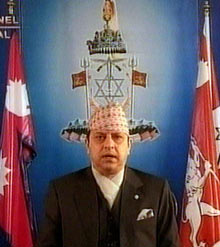Nepal tightens anti-terror law
Days before a countrywide opposition strike, Nepal's government has widened the sweep of its anti-terror law to allow anyone in contact with anti-monarchy Maoist rebels to be jailed as a terrorist.

Political leaders said Tuesday they fear the amended law would be used against them because the rebels have thrown their support behind the strike, which begins Thursday and is aimed at pressuring King Gyanendra to give up power that he seized last year after sacking the prime minister.
The parties plan to close down businesses, markets, schools and public transportation during the strike.
The alliance of seven opposition parties, meanwhile, hailed an announcement by the rebels to halt attacks in Katmandu, the capital. The rebel chief, who goes by the assumed name Prachanda, said Monday the decision was made in response to concerns of political parties and civil society groups.
Smaller demonstrations have already started. Twenty students were detained Tuesday after police fired tear gas and beat pro-democracy protesters with batons, according to student leader Suresh Gautam and a police officer who declined to be identified by name because he is not authorized to speak to the media.
Arjun Narsingh of the Nepali Congress, the largest party in Nepal, told The Associated Press on Tuesday that changes in the anti-terror law are an attempt to "threaten and terrorize the opposition parties and the media."
The amended Terrorists and Disruptive Activities Control and Punishment Ordinance defines "terrorist accomplices" as those who have any contact with the rebels. That has raised concerns about party activists and civilians, who are often coerced into supporting the guerrillas, and journalists who cover rebel gatherings and interview their leaders.
"This will be another weapon for the government to strike against the media, which is already under many restrictions," said Bishnu Nisthuri, president of the Federation of Nepalese Journalists.
A senior U.N. official said the government was not giving the parties enough political space for peaceful protests.
"What I hear is not the message I would like to hear from the government, that peaceful protests is a right and should be upheld and security forces should use only absolute minimum force in maintaining law and order," Ian Martin, the Nepal representative of the U.N. High Commissioner for Human Rights, said Monday.
Under the amended anti-terror law, anyone who disseminates the information about the rebels could face one to three years in prison and fines of up to 50,000 rupees (US$700; Ђ 580).
Human rights groups say hundreds of people have already been detained under the law, which allowed for the detention without charge for up to a year of anyone suspected of sympathizing with the communist rebels, reports the AP.
Subscribe to Pravda.Ru Telegram channel, Facebook, RSS!





